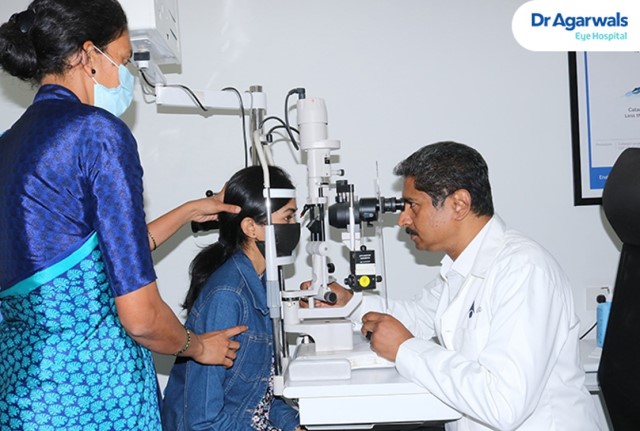BENGALURU: Regular annual eye screenings play a pivotal role in identifying potential vision issues before they escalate, allowing for timely interventions. By detecting signs of low vision early on, individuals can receive the necessary care and support to maintain optimal visual health.
As part of observing Low Vision Awareness Month, Dr. Nishant, Consultant – Paediatric Ophthalmology at Dr. Agarwals Eye Hospital Bannerghatta, urged increased awareness among both the general public and medical professionals regarding the early recognition of low vision issues and prompt initiation of treatment. He emphasized the importance of understanding low vision and blindness, including their causes, and highlighted the significance of early detection. Dr. Nishant also delved into the latest advancements in understanding, treating, and preventing various eye diseases, as well as the utilization of visual aids for enhancing vision.
Blindness signifies a complete loss or severe limitation of vision, while low vision denotes persistent visual challenges despite treatment. Understanding these distinctions is crucial in promoting awareness and support for those navigating visual impairments. A variety of conditions contribute to low vision, such as Macular Degeneration, Glaucoma, Diabetic Retinopathy, Retinitis Pigmentosa, optic nerve damage, Albinism, Cataract, Cortical Visual Impairment, Corneal Opacity, Toxoplasma, Retinal Detachment, and Amblyopia.
Dr. Nishant said “With millions affected by blindness and visual impairment in India, including thousands of children, the call for heightened awareness and action is urgent. Visual impairment not only hinders professional endeavors but also impacts daily activities. Yet, with adequate visual aids and support, individuals with low vision can overcome challenges and thrive independently. Early intervention not only preserves vision but also reduces the risk of complications that can significantly impact overall health and quality of life.”
Recent technological advancements have introduced a variety of aids to assist those with low vision. Optical devices, including hand-held telescopes, spectacles, and magnifiers, along with non-optical aids like reading lamps and guides, have made significant differences. Furthermore, electronic devices such as Closed-Circuit Video Magnification, as well as computer hardware and software providing screen magnification, synthesized speech, and tactile display, offer modern solutions to the challenges of low vision.
“It’s crucial to instill the habit of eye check-ups from a young age, as many vision problems can be effectively managed if detected early. By screening children between 3-5 years old, eye health professionals can identify conditions like amblyopia (lazy eye) or strabismus (crossed eyes), which, if left untreated, can lead to permanent vision impairment. Similarly, adults over 40 are at higher risk for age-related eye conditions such as cataracts, glaucoma, and macular degeneration. Annual eye examinations can catch these conditions in their early stages when treatment is most effective. Moreover, individuals with diabetes and hypertension are susceptible to diabetic retinopathy and hypertensive retinopathy, respectively, which can cause severe vision loss if left unmanaged. Regular eye check-ups for these patients are crucial for detecting signs of retinal damage early and implementing measures to prevent further progression.” added Dr. Nishanth.
This Low Vision Awareness Month, Dr. Agarwals Eye Hospital is dedicated to raising awareness about the significance of eye health and the technologies available to assist individuals living with low vision. By disseminating knowledge and promoting regular eye examinations, the hospital aims to collaborate in mitigating the impact of low vision on both individuals and society.

